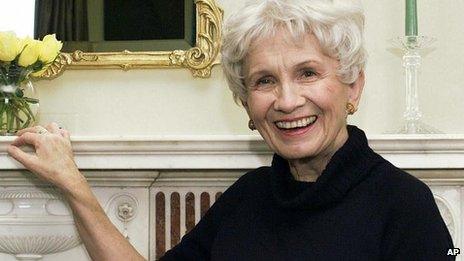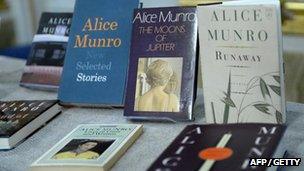Profile: Alice Munro
- Published

Munro, who announced her retirement this year, said she wrote short stories as they were all she could do
The Nobel committee has called Canadian author Alice Munro, the winner of its 2013 prize for literature, a "master of the contemporary short story".
The 82-year-old said she knew early on that she wanted to be a writer and started penning stories as a teenager.
But earlier this year she told the New York Times that "back then you didn't go around announcing something like that".
"You didn't call attention. Maybe it was being Canadian, maybe it was being a woman. Maybe both."
She won a scholarship to study journalism at the University of Western Ontario and was still there when she had her first work, The Dimensions of a Shadow, published in 1950.
Her big break-through came many years later, with her first short story collection, Dance of The Happy Shades - which won Canada's highest literary honour, the Governor General's Award, in 1968.
Ten years later she won the prize for the second time (of three) with her collection of interlinked stories Who Do You Think You Are? Published in the UK as The Beggar Maid, it was shortlisted for the Booker Prize in 1980.
Despite her mastery of short stories, Munro only ever completed one novel, Lives of Girls and Women.
"For years and years I thought that stories were just practice, till I got time to write a novel," she said during a 2012 interview with the New Yorker, external, which has published several of her stories.
"Then I found that they were all I could do, and so I faced that."
In other interviews, she was more cavalier: "You might die while writing a five-hundred-page novel," she once noted.
Small-town life
Munro is often compared to Anton Chekhov, for her warmth, insight and compassion and is known as a thorough but forgiving chronicler of the human spirit.
Since the 1960s, she has published more than a dozen collections of short stories and, in 1980, she took up the position of Writer-in-Residence at both the University of British Columbia and the University of Queensland.
Her collections often focused on life in small-town Ontario, where she was raised, "because I live life here at a level of irritation which I would not achieve in a place that I knew less well".
"There are no such things as big and little subjects. The major things, the evils, that exist in the world have a direct relationship to the evil that exists around a dining room table when people are doing things to each other."
Many stories capture the difference between her own experiences growing up in Wingham (which she renames Jubilee or Hanratty) and her life after the social revolution of the 1960s.

Munro has published more than a dozen collections of short stories
She described the relaxation of social conventions in the era as "wonderful".
"Having been born in 1931, I was a little old, but not too old, and women like me after a couple of years were wearing miniskirts and prancing around," she said.
"I was brought up to believe that the worst thing you could do was 'call attention to yourself,' or 'think you were smart'. My mother was an exception to this rule and was punished by the early onset of Parkinson's disease," she has said.
It was her schoolteacher mother's diagnosis that first caused Munro to seek solace in books, at the age of 10.
In her village, women were expected to knit instead of reading (except on Sundays) but she was able to follow the example of her father, himself an avid reader.
She remembers rewriting the end to Hans Christian Anderson's The Little Mermaid, because she found the book's conclusion, where the mermaid has to choose between killing the prince and going back to the sea, too sad.
Her writing took her to university, but she dropped out after two years to marry fellow student James Munro, with whom she had three children and became a full-time mother.
However her passion was ignited again after she and Jim opened a paperback-only bookshop, Munro's books, in Victoria, British Columbia.
The shop is currently celebrating its 50th anniversary with a book prize of its own. Fifty books, one from every years of its existence, have made the shortlist - including four by the proprietor: The Dance Of The Happy Shades; Lives of Girls and Women; Who Do You Think You Are? and Dear Life.
Final story
In 2009, she won the Man Booker International Prize for her entire body of work.
In a statement, the judges said she "brings as much depth, wisdom and precision to every story as most novelists bring to a lifetime of novels.
"To read Alice Munro is to learn something every time that you never thought of before."
Her well known story The Bear Came Over the Mountain was made into the film Away from Her, starring Julie Christie and Gordon Pinsent.
The Munros divorced in 1972, and Alice later remarried a former university friend, geographer Gerald Fremlin. She said they got had a nervous. three-martini luncheon date and had decided to move in together by the end of the afternoon.
Following his death in April this year she told the New York Times they had been "tremendously close".
In 2009, the author revealed she had been receiving treatment for cancer. She also had bypass surgery for a heart condition.
As a result, she said her most recent book, a collection of partly-autobiographical stories, was to be her last.
Dear Life was "a little more special in that I'm probably not going to write anymore. It's nice to go out with a bang," she told Canadian publication the National Post.
"Not that I didn't love writing, but I think you do get to a stage where you sort of think about your life in a different way."
Always a writer of great humility, she characterised her career as the only option open to her.
"I think maybe I was successful in doing this because I didn't have any other talents," she said in an interview with Book Lounge.
"I'm not really an intellectual. I was an ok housewife, but I wasn't that great.
"There was never anything else that I was really drawn to doing - so nothing interfered, in the way life interferes for so many people."
- Published10 October 2013